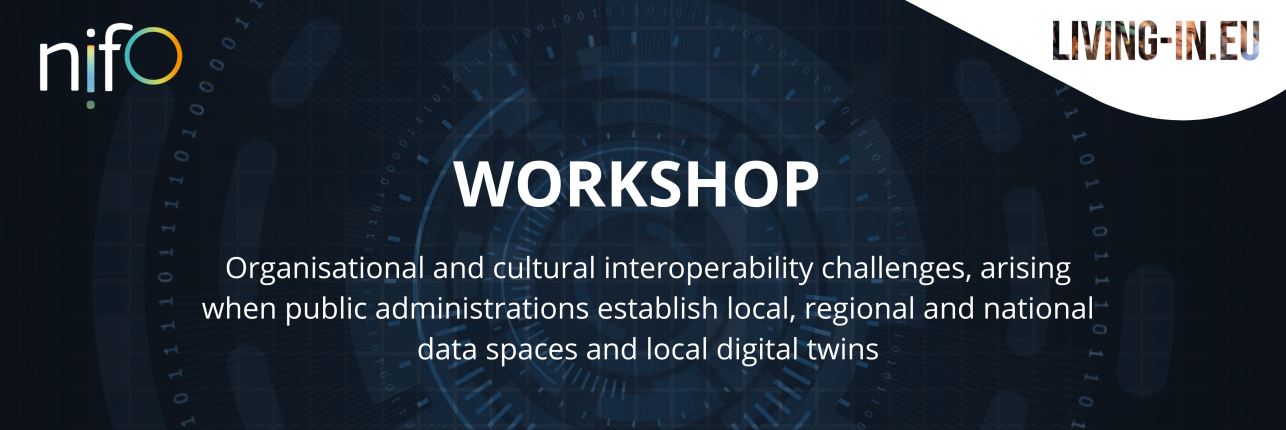Signatory event on organisational and cultural interoperability
On 9 March, Living-in.EU and Wavestone organised an interactive workshop on the organisational and cultural interoperability challenges that local administrations may face when implementing data spaces and local digital twins.
The workshop was part of a broader set of targeted consultations activities under the study on organisational and cultural interoperability issues arising in local administrations when establishing local, regional, or national data spaces or local digital twins drawing on examples from European public administrations which are carried out by Wavestone for the European Commission’s Directorate General for Communications Networks, Content & Technology (DG CNECT) within the National Interoperability Framework Observatory (NIFO) led by the Directorate General for Informatics (DIGIT).
The objective of the study
The study aims to provide an analysis of organisational and cultural interoperability issues, two components of the European Interoperability Framework for Smart Cities and Communities (EIF4SCC) interoperability model, identified in local or regional administrations when establishing data spaces or local digital twins. In addition, recommendations will be provided on how to support the roll-out of a European-wide smart communities data space and interconnected local digital twins.
Structure of the workshop
A presentation of the preliminary findings from the study was followed by an interactive session facilitated by Wavestone.
Participants shared their insights on the roles and responsibilities of stakeholders to tackle a series of organisational interoperability challenges, namely:
- common rules and processes;
- technical interoperability issues & common standards; and
- definition of common objectives.
Key findings - Roles and responsibilities
According to stakeholder’s views, political leaders play a key role in setting up cross-departmental and cross-sectorial collaboration, steering the vision of the desired outcomes, defining the timeline and scope of the smart city initiative, and adopting regulations enabling the implementation of local digital twins and data spaces. Public administrations are responsible for the implementation of the smart city strategy and the setup of a user-centric process to foster the public sector’s digital capacity.
They are supported in these tasks by technical experts (e.g., Chief Technology Officer, Chief Digital Officer). Within the public administration, several departments (e.g., the IT department, the R&I department) can promote the digital transformation internally, monitor data governance initiatives, and develop citizen-oriented information systems. Additional experts such as procurement experts and legal experts can be mobilised for procurement procedures, GDPR assessments, and to exchange with stakeholders (e.g., businesses, academia).
Key findings - Adressing cultural interoperability challenges
Participants also provided additional perspectives on the roles and responsibilities of stakeholders to address a series of cultural interoperability challenges, namely:
- the need for a paradigm shift regarding data sharing;
- the lack of trust due to cultural differences regarding data; and
- awareness on the benefits of smart city initiatives.
By steering the definition of the objectives of local digital twins and data space initiatives, political leaders ensure transparency of data sharing and raise awareness on the benefits of smart city initiatives. They are supported by public administrations which need to foster their understanding of the life cycle of data and build trust with external stakeholders. Participants highlighted the key role of HR departments in the recruitment process to strengthen the public sector’s digital skills. Technical, procurement, and legal experts also may contribute to mitigating cultural challenges by leveraging their domain of expertise and contributing to the development of a collaboration environment enabling the exchange of open data.
Next events
If you missed the session, another workshop open to the general public is planned to take place online on 29th March 2023, from 10:00am to 12:00pm CEST. This workshop will be an opportunity to:
- gain an overview of the main findings with regard to organisational and cultural interoperability challenges;
- discuss and share feedback on the identified roles and responsibilities of stakeholders when dealing with such challenges;
- identify potential gaps; and
- be informed about the next steps of the study.
In order to register for this upcoming workshop, please follow this link. Additional information about the workshop is available here.
Join the Living-in.EU movement!
Any city, region, metropolitan area is welcome to join the Living-in.EU movement. By becoming part of the movement, you will be connected to fellow cities, regions, supporters and many initiatives around digital transformation. You will get guidance on your local challenges on digital issues. Last but not least, you will become an active member of the European movement to strive digital transformation in Europe by 2030.
Sign the declaration here








